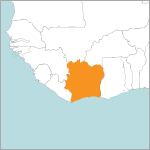
Recognizing the critical role that nutrition can play in effective responses to infectious diseases, the Government of Côte d’Ivoire has worked to strengthen nutrition and food interventions for people living with HIV, tuberculosis patients, orphans and vulnerable children, and other at-risk groups. From 2008 to 2018, FANTA worked closely with the Ministry of Health and AIDS Control and the Ministry of the Family, Women, and Social Affairs to support Côte d’Ivoire’s national programs that promote integrated nutrition programs and services. FANTA strengthened the capacity of the Ministry of Health and AIDS Control to integrate nutrition assessment, counseling, and support (NACS) into its HIV and tuberculosis services by developing training, tools, and guidelines, as well as providing coaching to service providers. FANTA worked to improve the link between facility-based NACS services and food security and livelihood support services and to strengthen referrals between community social centers and NACS facilities. In addition, FANTA strengthened the nutrition care of orphans and vulnerable children by strengthening the capacity of service providers to promote optimal feeding practices for HIV-exposed infants and young children and improving the capacity of social services centers to provide nutrition services at the community level.
FANTA’s activities in Côte d’Ivoire included:
Integrating NACS into HIV and tuberculosis services by developing training, tools, and guidelines
- NACS Nutrition Training Materials
- Nutrition Assessment, Counseling and Support (NACS) Job Aids
- National Recipe Guide Using Local Foods to Improve the Nutritional Status and Health of Adolescents and Adults in Côte d’Ivoire
Improving the link between services and strengthening referrals between community social centers and NACS facilities
- FANTA Recognized for Helping Government of Côte d’Ivoire Mobilize Resources for the 2016-2020 Multisectoral Nutrition Plan
- Strengthening the Links between Health, Social, and Community Structures: Lessons Learned and Best Practices
Strengthening the capacity of service providers to promote optimal feeding practices for HIV-exposed infants and young children


